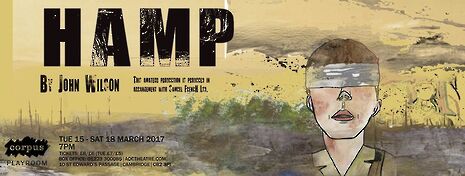Women at war: why an all-female production of Hamp is important in 2017
Director Charlie Morrell-Brown tells Ellie Mullett why this historical exploration of PTSD and the masculinity of war deserves a place in the spotlight

Fresh from a four-hour rehearsal, Hamp director Charlie Morrell-Brown is tired but anxiously excited about his forthcoming production at the Corpus Playroom when he saunters into our staircase gyp to discuss what can be expected from one of Lent’s last theatrical offerings. The setting is ironically appropriate, for Hamp is a play firmly rooted in reality. It is no glamour or fantasy world, but, as Charlie explains, a recreation of the “gritty, raw feeling of the experience of war”.
“As much as the Shot at Dawn Memorial is representative of all those who were executed merely because they were deemed to be cowards, Private Hamp is similarly a figure that encapsulates the horror of war that many soldiers went through” is Charlie’s response when I ask him why this play is relevant to the modern day. He elaborates by saying that the storyline centres around the trial of Private Hamp (Rachel Kitts) as he is tried for desertion while suffering post-traumatic stress disorder.
“It is vitally necessary to commemorate the fallen soldiers, and raise awareness”
Added to this is the fact that 2017 marks the centenary of the Battle of Passchendaele, the fifth deadliest battle of World War One. As a first-year historian, Charlie decided to direct this play in particular because “it is vitally necessary to commemorate the fallen soldiers, and raise awareness”. Before the military death penalty was outlawed in 1930, deserters were deemed cowards, and shot for their actions. Those who faced such a fate weren’t pardoned until 2007. Hamp promises to bring our attention to those whose fates might not have been so heroic, but should be commemorated nonetheless.
The nine-strong cast is deliberately made up entirely of women, in the hope that this will to raise questions about the role of masculinity on the battlefield, and perhaps invoking a different perception of the story if the cast were male. The exploration of PTSD contributes further to the idea of changing perceptions, for this is something still surrounded by misconceptions today. Hamp is a naive character who “really struggles to articulate his feelings”, and will provoke a spectrum of emotions from onlookers, so I am told.
A seat in the audience looks to be an intense experience. The Corpus Playroom is an intimate venue, made even more so by the fact that whole play is set in a barn. Charlie describes the task of trying to expand the play outside the constraints of those four walls as “challenging”, but intermittent scenes of warfare designed to invoke the trauma of war will be provided through clever use of light and sound production. There will be no interval: “Hamp is trapped in what would today be an unthinkable position, but the audience will be locked in with him”.
Charlie gives no hints as to how the play will end, instead proffering a question which should be sitting in the mind of the audience as they watch: is everyone too preoccupied with war to concern themselves with such an insignificant crime, as Hamp reassures himself, or will he pay the ultimate price? Watching Hamp will require historical empathy, to understand viewpoints which would be incomprehensible today, but will no doubt broaden the minds of those who watch. So bring tissues, and prepare to take a dip into a whirlpool of emotion, as we find out what will become of Private Hamp.
Hamp runs from Tue 14th - Sat 18th March at the Corpus Playroom, 7pm
 News / Fitz students face ‘massive invasion of privacy’ over messy rooms23 April 2024
News / Fitz students face ‘massive invasion of privacy’ over messy rooms23 April 2024 News / Climate activists smash windows of Cambridge Energy Institute22 April 2024
News / Climate activists smash windows of Cambridge Energy Institute22 April 2024 News / Copycat don caught again19 April 2024
News / Copycat don caught again19 April 2024 News / Emmanuel College cuts ties with ‘race-realist’ fellow19 April 2024
News / Emmanuel College cuts ties with ‘race-realist’ fellow19 April 2024 Comment / Does Lucy Cavendish need a billionaire bailout?22 April 2024
Comment / Does Lucy Cavendish need a billionaire bailout?22 April 2024





